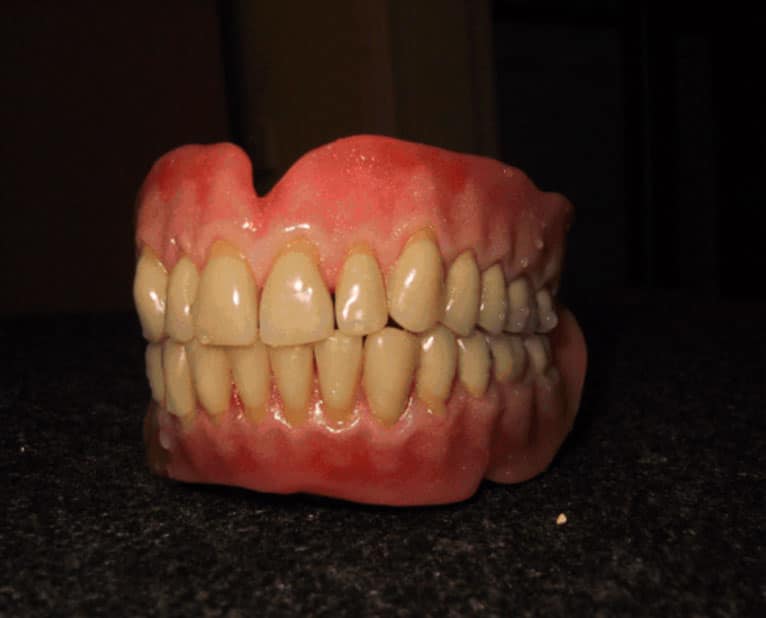There are a few things to consider when looking after your dentures. If you’re new to false teeth, it might take some time to get used to the routine of them, however, taking these measures can help to maintain your oral health. When first getting dentures, you’ll usually be given information on how to clean them. This can sometimes vary depending on the type of dentures you have, however, there are a few basic essentials that will apply to most types.
It’s important to take care of your dentures, not only to keep them in good condition, but also for your own health. Below are some of the main factors to consider when taking care of your dentures.
Cleaning Your Dentures
Like regular teeth, you will have to clean your dentures to help avoid any build-ups of food and plaque. Brushing them daily also helps to prevent stains on the dentures, keeping them looking good for longer. When cleaning your dentures, you’ll need to remove them from your mouth and hold them over a sink of water or a towel. This will prevent you from accidentally dropping your dentures onto a hard surface, which could then break or damage them.
To clean your dentures, you should use a soft-bristled brush and a non-abrasive denture cleanser. The soft bristles will prevent any damage or wear on the dentures, which hard bristles may cause. Brush gently over the dentures, and be careful when handling them. Dentures should be brushed daily to remove unwanted deposits such as food and plaque.
You should also clean your mouth daily to maintain the health of any natural teeth you have, as well as to keep overall oral hygiene. For this you should also use a soft-bristled toothbrush, cleaning your teeth, your tongue, cheeks and your palate (the roof of your mouth). If you use denture adhesive, this should be removed whilst cleaning out your mouth.
How to Handle Dentures
Whilst dentures are designed to fit inside your mouth, there are times when you won’t be wearing them. To keep the shape and structure of your dentures whilst they’re not in your mouth, you’ll need to keep them moist. To do this, you can soak them either in water or a denture cleaning solution. It’s important not to soak your dentures in hot water, as this can compromise their shape. The way you handle your dentures when not wearing them may vary. For example, dentures with any metal attachments may be ruined if soaked in a solution. When getting your dentures fitted, your dental professional should give you advice on how to best care for them.
When you aren’t wearing your dentures, it’s best to make sure they’re not at risk of falling onto a hard surface. When handling them it might help to do it over a soft surface, such as a towel, meaning if you accidentally drop them, they’re less at risk of breaking.
Adjustments and Repairs to Dentures
When first getting your dentures fitted, you’ll be likely to need a few follow-ups at the clinic. These follow-ups are used to check how you’re doing with the dentures, and to make any adjustments when necessary. It is important not to try and adjust or repair dentures by yourself, as you could end up worsening their structure, and cause problems with your oral health. If you’re having any issues with your dentures, it’s important to seek help from a professional. Dentures that do not fit may cause damage to the mouth, such as sores on the gums.
Your denture might get breaks, chips or cracks in it. If this happens, it’s crucial that you do not wear them, and seek a replacement instead. Also, denture clinics and labs will have different finance options for dentures of all types, which may sometimes include some minor and routine adjustments.
Will I Ever Need to Replace My Dentures?
Dentures that become broken will need to be replaced. However, this is not the only instance when you may need to replace your dentures. Over time, your mouth will experience natural, physical changes, which can often cause a denture to become misaligned or loose. When this happens, they will need to be altered, or remade entirely, to properly accommodate to any changes to your mouth. Wearing dentures that don’t fit anymore can cause great discomfort, and even damage, to your mouth. It’s vital that you seek professional help if and when your dentures start to become uncomfortable.
How Often Should Denture Check-Ups Be Scheduled?
If you have dentures, your healthcare professional will advise you on how often you’ll need to check-in with them. Some dentists recommend that you should visit every six months for regular check-ups. However, your dentist or oral healthcare professional will advise you on how frequent these should be for you. These visits can help to make sure that both your mouth and your dentures are in good shape, identifying any issues that may have gone unnoticed.

